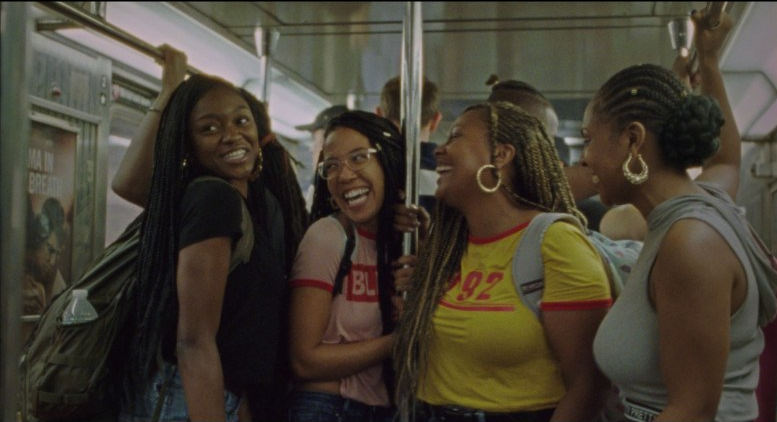Black Women Can Be Loved
- Consensual Humans

- Feb 17, 2021
- 4 min read
Jessica Somersall
“I am a Black woman who is strong at times, but I am also human and deserve love and protection."
As it is Black History Month and was recently Valentine's Day, I think it is important to talk about love; especially from the perspective of Black women. For this article, I want to focus on both platonic and romantic love. Over the week, I had the chance to watch two films that expressed and shared Black women's perspectives in relation to love: Premature, written by Rashaad Ernesto Green and Zora Howard, and Malcolm and Marie, written and directed by Sam Levinson. I aim to address heteronormative relationships through the relationships shown in these movies. However, I recognize it is more difficult for Black LGBTQ+ people in romantic relationships, and while I am interested in exploring this space as an ally, I need to be more educated on that space so I can objectively analyze it.
In Premature, there are two elements of love displayed through Ayanna, the protagonist: her platonic relationship with her friends, and her romantic relationship with her boyfriend. The platonic relationship displayed between Ayanna and her female friends mimics the relationships which a lot of Black women share; a friendship that relies on one another when one is down. For some reason, however, many films depict Black women as competing with each other, or competing against their White counterparts. There is rarely a film where a Black woman is allowed to just exist; it seems as though most films involve a Black woman metaphorically "proving" herself.
There were also some interesting dialogues that explore topics such as being a Black woman and dating. There are statistics that prove that educated Black women find it more difficult to find love compared to people of other races. While there are many factors that contribute to this, it is important to think about the preconceived notions many people have regarding Black women; for example, the stereotype of the sassy assistant, or the sex-addicted vixen. Within Premature, it was refreshing to see young Black women portrayed in a positive light, because movies tend to play on the stereotype of the bitter Black woman who complains of being single, although she is only "bitter" because of her past experiences. There is still a strong narrative that Black women are "a lot to handle," which is an outdated stereotype that needs to be crushed.

There is often a negative perpetuation of Black women in romantic relationships within movies which spill into Black women's narratives in real life. As such, Black women have to work hard to dispel these stereotypes; something which would happen faster if they had the support of Black allies to change these narratives. This mindset is also reflected in Premature, as one of Ayanna's friends casually says "Black women always know how to split themselves up, and n****'s think they get the best piece." Why must Black women hand out pieces of themselves, in order to be desired romantically? What piece do they keep for themselves? A show which works hard to dispel this narrative is Spike Lee's She's Got to Have It, which dispels the story arc of the Black woman as a secondary character who is unable to be loved. We need more shows like this to centralize Black women as people who are capable of loving and being loved.
Spoiler Alert Ahead: With Malcolm and Marie, their love story spilt into reality, and every conversation the couple had felt grounded and real. The writing, acting, and cinematography displayed Malcolm and Marie's relationship in its entirety, complete with both flaws and joy; a refreshing change to see in Black movies. To set the scene, Malcolm is a popular director and screenwriter, and Marie was the inspiration for his latest successful movie. Throughout the film, Marie wants to be appreciated by her partner and acknowledged as someone who inspired him. This leads to a large argument between the couple, but ties into real-world issues; Black women are often forgotten or disregarded in the work they do. For example, the Me Too movement was founded by Tarana Burke in 2006, a Black woman, yet this was not acknowledged until 2017. Going back to the film, Marie discusses her relationship with Malcolm, and how he needed to belittle her to feel like a man, often using substance abuse and Marie's mental health issues to manipulate her. While it is ultimately unsuccessful, it is difficult to watch a Black woman be subjected to such verbal and emotional abuse, and it is clear Malcolm and Marie are in an unhealthy relationship.

However, Marie is written in a way that subverts stereotypes; for the whole movie, she is one step ahead of Malcolm. This reaches a breaking point at the end of the film when she says Malcolm needs her more than she needs him, and she is disgusted with how he has treated her. The film's open ending leaves the audience to decide if the couple separates or not, and points out a fact of life: there is always baggage which never really allows us to be free, but it is up to you what you do with it, and only you can decide how to live your life.
That being said, I do think films are changing, especially with the activities that have happened this year. It’s exciting to see and hear!








Comments